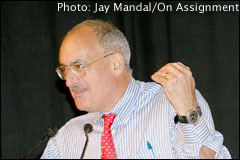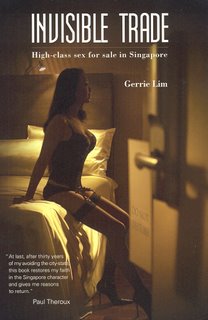
Rakesh Roshan's Bollywood bonanza Krrish, his sequel to the super hit Koi Mil Gaya, starring his star son Hrithik Roshan, has been one of the most awaited movies of the year in Bollywood circles. For months, it has been promoted as India's first Superhero movie. The action sequences and special effects were tauted as the best Bollywood had ever seen. In fact, Roshan Sr said in an interview that "It (special effects) is not like Hollywood. It is Hollywood."
For me and many watchers, Krrish has been special also because it was extensively (60%) shot in Singapore. Singapore Tourism Board (STB) invited the Roshans to shoot the movie here and promote Singapore, hoping to repeat the Roshan effect on Indian tourists what they had seen in the case of New Zealand (Roshan's earlier film Kaho Na Pyaar Hai was shot in NZ and it had apparently increased the tourist influx to NZ many times over).
I haven't seen the film yet but the reviews have been kind of mixed.
Rajiv Masand says in IBNLive: "Yes, Krrish may actually be Bollywood's first stab at a superhero story, and the intention is commendable, but the effort leaves a lot to be desired." He adds: "My biggest complaint against Krrish is directed towards its screenplay: It stinks."
Sukanya Verma says in Rediff.com: "The production values are shoddy. SFX team of Marc Kolbe and Craig Mumma's shabby use of super imposed background is annoying and distracting. Cinematographer Santosh Thundiiayil could have opted for a darker, slick look. Instead, he lends Krrish an extra-bright and powdery appearance befitting a detergent commercial. Siu Tung Ching and Sham Kaushal's action gets no points for originality. Most of it is borrowed from Matrix flicks and is repetitive in nature. Surely there must be more to a superhero than surging from one pole to another. This gratification comes to you only in the tail end of the movie. Krrish neither has the sleek aura nor the deep-rooted ideology of superheroes. What it does have is a super spirited performance from Hrithik Roshan, which is likely to appeal to kids. And that's worth a three-star cheer."
Raja Sen in Rediff.com has another view to offer: "Do the Krrish writers succeed? Not really. While luxuriously taking up almost three full hours of screentime, they plod through an extremely derivative landscape. Ideas are borrowed from a bunch of movies -- the few people who have watched John Woo's Paycheck will feel some déjà vu -- and effect-shots from a million more, including The Matrix films, Spider-Man, and Crouching Tiger Hidden Dragon. And watch out for the distinct Batman hangover when he actually dons the mask. Krrish is mired by predictability. There are no big revelations, no sudden surprises. There's also no real character involvement, the viewer not actually caring enough about Krrish but just, like the protagonist himself, caught up in all his contrived coolth. However, the fact that it's exactly what the KMG fan expects is the reason the sequel will actually succeed. I'd bet on a sequel to Krrish."
That is a bit positive. More positive is Diganta Guha in The Hindustan Times: "Technically, Krrish is perhaps the best in Bollywood history, whether in terms of action, special effects, cinematography or sound. There's little for the actors to do but deliver their bit and let Roshan Sr take the credit for a brilliant package...The sleek action sequences by Hong Kong-based Tony Ching Siu Tung and Sham Kaushal set a new trend, and combined with the special effects by US-based Marc Kolbe and Craig Mumma, they are a treat to watch...Krrish is a breath of fresh air into the staid world of Bollywood, much like Sanjay Leela Bhansali's Black. Watch it for its own sake and feast your eyes on the spread Roshan Sr has laid out for you."
Wah! That is a wonderful review for Krrish. Roshans must be happy to read this but the site looks like the official promotional site of Krrish.
Surprisingly, none of the above mentioned reviews have mentioned, not even once, the breathtakingly beautiful scenes from Singapore and how well Roshan has exploited their picture postcard prettiness!
In fact, on the other side of the Singapore River, Singapore's Today film reviewer had some complaints against Roshan's portrayal of Singapore in "A prosaic portrayal: Krrish makes Singapore look uninteresting" (June 24, 2006):
"There is a good reason why so many Singaporean film-makers choose to set their films in Singapore's grittier spaces: There is little that is interesting about Singapore's snazzy side. And that is one of the problems with the blockbuster-wannabe Krrish — the first Bollywood film to be funded under the Singapore Tourism Board's $10-million Film in Singapore! Scheme."
"It doesn't make Singapore look terribly interesting."
In this sequel to the 2004 hit Koi Mil Gaya, Hrithik Roshan plays Krishna, a man with supernatural powers — his father was, wait for it, empowered by an alien called Jadoo — who falls in love with Priya (Priyanka Chopra) and follows her to Singapore. The problem is, Priya initially wants only to exploit his powers to score a hit show for the TV station where she works. So, Krishna and Priya go traipsing through Singapore's most prominent places in their courtship. Audiences get to see Shenton Way, Sentosa, Chinatown and Boat Quay filmed in the most prosaic ways. Buy a postcard and you'd get the same picture."
"Perhaps to add interest to banality of the setting, the film also portrays a seedier Singapore that doesn't really exist. As Krishna steps out of Changi Airport, two thugs on a motorcycle try to grab his belongings. And if the film is to be believed, Clifford Pier is a hangout for motorcycle thugs who speak bad English."
Whatever the criticism and irrespective of Krrish's aforementioned weaknesses, the film is going to increase the Indian tourist inflow to Singapore. After all, millions of Indians seeing the beautiful Singapore shots in the Krrish songs playing on their telly day and night won't be able to ignore the charm of the lion city.





